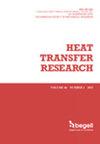基于响应面方法的新型晶格散热器优化,用于电流体动力(EHD)喷雾冷却
IF 1.6
4区 工程技术
Q3 THERMODYNAMICS
引用次数: 0
摘要
近年来,电子设备的体积越来越小,而处理能力的提高却导致了热通量的逐步升高。因此,这些设备的性能下降,使用寿命缩短。虽然传统的冷却方法不足以去除表面的热量,但新的冷却技术,如电流体动力喷雾(EHD-spray)冷却技术,在保证这些系统在预定条件下运行方面显示出了希望。EHD 喷雾又称电喷雾,是一种雾化方法,可提供均匀一致的液滴。尽管文献中的许多研究都使用了 EHD,但其在热传递中的应用直到最近才成为一个重要的研究领域。EHD 喷射具有所需的流体量极少、能量低等重要优势,但有关它的研究却很有限,而且几乎没有使用翅片散热器的研究。在所进行的研究中,采用选择性激光熔化(SLM)方法生产的独特设计散热器通过响应表面法(RSM)盒-贝肯设计(BBD)管理进行了优化,这是最有效的设计方法之一。在以散热片表面积(HSSA)、流体成分比(FCR)和流速(FR)为可变参数的研究中,发现流速为 17 ml/h 的 100% 蒸馏水的传热系数(HTC)最高,而散热片的表面积最小。结果表明,超高压喷射在高热通量系统冷却方面大有可为。本文章由计算机程序翻译,如有差异,请以英文原文为准。
Response surface methodology-based novel lattice heat sink optimization for electrohydrodynamic (EHD) spray cooling
In recent years, the size of electronic equipment has become smaller, while the increased processing capacity has led to progressively elevated in the heat flux. As a result of this, the performance of this equipment decreases, and their service times decrease. Although traditional cooling methods are insufficient to remove the surface's heat, new cooling techniques such as electrohydrodynamic spray (EHD-spray) cooling shows promise in guaranteeing these systems operate in the intended conditions. EHD-spray, also known as electrospray, is an atomization method that provides equal and homogeneous droplets. Although EHD has been used in many studies in the literature, its use in heat transfer has only recently become an important research area. Studies on EHD-spray, which has important advantages such as requiring a very small amount of fluid and low energy, are limited, and there are almost no studies using finned heat sinks. In the study carried out, unique design heat sinks produced with Selective Laser Melting (SLM) method were optimized with Respond Surface Method (RSM) Box-Behnken Design (BBD) management, one of the most effective design methods. In the study where heat sink surface area (HSSA), fluid composition ratio (FCR) and flow rate (FR) were used as variable parameters, the highest heat transfer coefficient (HTC) was found for 100% distilled water at a 17 ml/h flow rate, and the heat sink had the lowest surface area. The results show that EHD-spray is promising for high heat flux systems cooling.
求助全文
通过发布文献求助,成功后即可免费获取论文全文。
去求助
来源期刊

Heat Transfer Research
工程技术-热力学
CiteScore
3.10
自引率
23.50%
发文量
102
审稿时长
13.2 months
期刊介绍:
Heat Transfer Research (ISSN1064-2285) presents archived theoretical, applied, and experimental papers selected globally. Selected papers from technical conference proceedings and academic laboratory reports are also published. Papers are selected and reviewed by a group of expert associate editors, guided by a distinguished advisory board, and represent the best of current work in the field. Heat Transfer Research is published under an exclusive license to Begell House, Inc., in full compliance with the International Copyright Convention. Subjects covered in Heat Transfer Research encompass the entire field of heat transfer and relevant areas of fluid dynamics, including conduction, convection and radiation, phase change phenomena including boiling and solidification, heat exchanger design and testing, heat transfer in nuclear reactors, mass transfer, geothermal heat recovery, multi-scale heat transfer, heat and mass transfer in alternative energy systems, and thermophysical properties of materials.
 求助内容:
求助内容: 应助结果提醒方式:
应助结果提醒方式:


